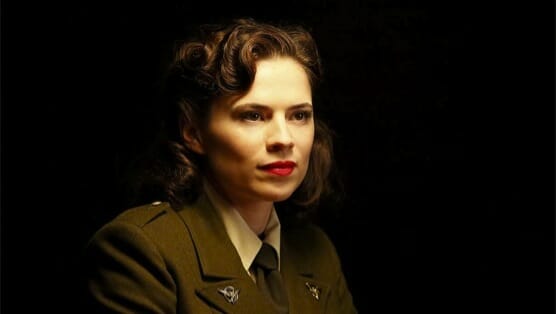
Villains. No, seriously, that is both literally and figuratively the answer to tonight’s title. What, exactly, are the things we bury? Villains. And villainous behavior.
Villains are important to a story. Much of the time, they can be more important than the heroes, and they are certainly harder to create. We relate to heroes, understand their logic. Villains’ motives are usually more complicated, and good villains well… we’ll get to that.
Daniel Whitehall (or Rinehart depending on what decade we’re in) is not a particularly well-written villain. He is, without exception, a standard Nazi-type; harsh accent, insane scientific beliefs, a blatant disregard for human life, racist… He’s not exactly breaking any stereotypes, Hydra or not.
Our first jump back in time shows Whitehall approaching murder in the way some of us might approach a particularly cliché April Fool’s joke. “No! Go on, and touch the vaguely suspicious item I’m handing you. I promise it’s not a spring-loaded can of snakes or, you know, instantaneous death.”
Whitehall is everything we expect in a villain. Even other villains dislike him. Skye’s father calls him small-minded. Mr. Ominous respects him, but it doesn’t take much manipulation from Bobbie before he is stewing over the possibility that Whitehall has somehow brainwashed him. Even Ward seems to find the current leader of Hydra petty and easily out-thought. Agent Carter (Yay Peggy!) isn’t even impressed with him enough to consider a deal, leaving him locked down in a S.H.I.E.L.D. detention facility to be forgotten.
Still the one thing you have to give Whitehall is his absolute dedication to violence. As his story progressed tonight, we find that he achieved his fountain of youth by performing a live dissection of a young woman who could touch the Diviner (or Obelisk, or Alien Geometric Weirdness) and who apparently didn’t age between 1945 and 1989. To add insult to injury, he dumps her body in the woods for her family to find. This callus disregard for human life is the functional definition of a Nazi scientist.
On our scale of well-crafted villains, Ward certainly takes the prize for most patience. He’s finally tracked his brother Christian down, and is not above beatings and psychological torture to get what he wants. This just happens to be Christian confessing that he tortured and nearly murdered their youngest brother, Tommy, at the well during their childhood.
In keeping with tonight’s burying theme, this literally results in Ward forcing Christian to dig up the well itself. While it’s certainly not the most shocking discovery that Ward’s story turns out to be true (Christian did in fact want to murder Tommy to punish the boys’ cruel abusive mother), the creepy smile on Grant’s face as he assures his brother that a confession and apology are all he’s after, does little to reassure us.
In perhaps his most violent and long-coming act of villainy yet, we find in the end that Grant has burned down his family home with his mother, father, and Christian inside, and used a recording of Christian’s confession to make it look like a murder-suicide. Great way to prove you’re not mentally unhinged, and you want to become a good guy, Ward. Don’t quit your day job. Which, of course, he doesn’t. For Grant, there’s no place like Hydra, sweet Hydra.
Finally we come to the Doctor, Skye’s Father, who I really feel at this point deserves a name. John or Jack, maybe? He looks like a Jack to me. It’s rare to find a well-developed villain, and rarer to find a well-developed villain whose default performance style is chaotic and eccentric.
Still the Doctor proves to be a great villain by committing to his cause. He’s willing to destroy mankind, because he feels he has nothing left. Well, at least, this is what he tells Whitehall. Actually, he is participating in the hunt for the lost city, because he believes it will lead to a reunion between him and Skye. I mean, I guess that’s what he tells Coulson. Okay, so he’s a bit manipulative. So maybe it’s when he’s talking to Ward (and by proxy to the audience)—a respectable villain—that his real motivation is revealed. In the last scene of tonight’s episode, the Doctor tells Ward, “It’s always good to look your enemy in the eye.” And well….
First, let’s take a moment to hop in the WABAC machine—a TARDIS or DeLorean will work just the same if you have one lying around—and revisit last week’s review. Remember when I asked, “Can we forgive our villains as easily as we forgive our heroes, and in the end, should we really be forgiving either one?”
Well, can we? And should we? How about forgiving someone if they’ve become a villain on a quest for justice? Or to stop a great evil? Are they even a villain at all if their motivation is just? Well, we all must decide for ourselves, but watching the Doctor find the body of his wife, Skye’s mother, after she’s been tortured and murdered by the future Doctor Whitehall certainly makes you rethink concepts of right and wrong. It grants extra depth to the eccentricities of Skye’s father, and creates for us a villain who is not only fascinating to watch, but whose motivation goes beyond simple explanations. So maybe the question now, is this: Is the villain who hunts other villains really a villain at all?
Katherine Siegel is a Chicago-based freelance writer and director and a regular contributor to Paste. You can find out more by checking out her website, or follow her on Twitter.